Text
Knowing that Pedro Sanchez's wife was born in Bilbo, I'm surprised the lawfare hasn't accused her of being a member of the komando Bizkaia quite honestly.
2 notes
·
View notes
Text
Newsflash: center-left Spaniards discover the Spanish deep state is rotten and fascist.
12 notes
·
View notes
Text

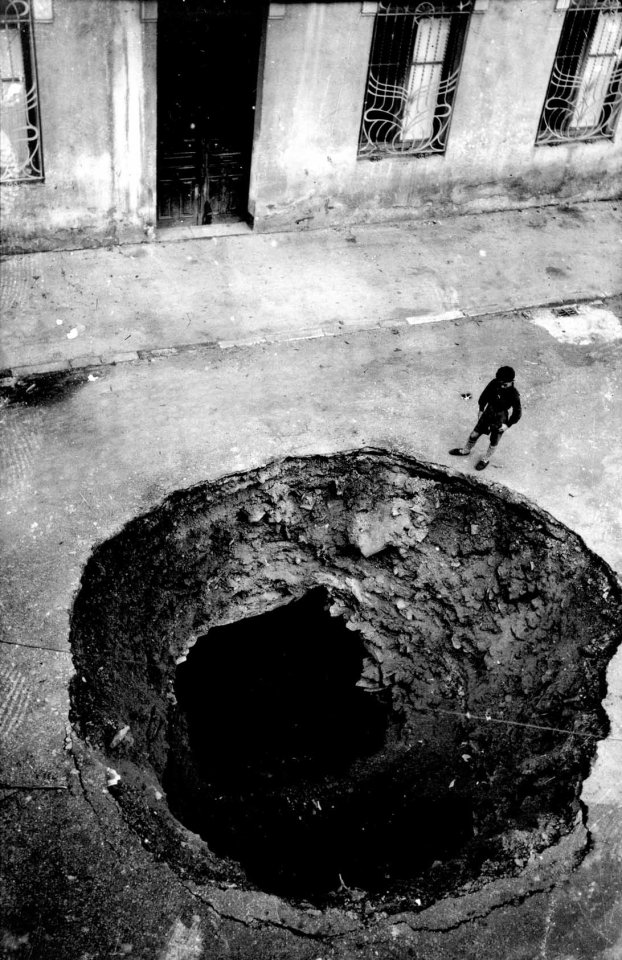
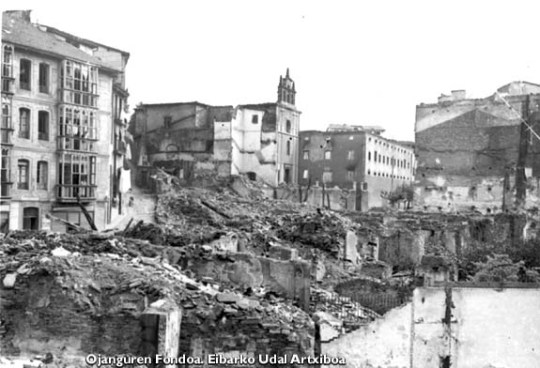
On April 24-25th 1937, Eibar was bombed non-stop by Italian Aviazione Legionaria. They left 74 dead, ~100 wounded, and a mostly destroyed town.
This was just the preface of what would happen the following day in Gernika.
5 notes
·
View notes
Note
Hello!! I read something a while ago that said there were "paths" in EH that during WWII were used by Jews to flee from France to Spain, and that there were Basque groups that would organise these escapes! Have you ever heard of this?
Kaixo!
There were those paths indeed, but they were not massively used by Jews to flee France. Friendly reminder that Spain was an ally of Nazi Germany and they were persecuted by the dictatorship too.
These paths were very well known by Pyrenean people - Basque and Aragonese - and they were mostly used for smuggling since Spain was then an autocracy that didn't allow any commerce with foreign states. Shepherds, women, and children that lived in the mountains used their secret paths away from the roads to cross the border and buy-sell some products.
They were known as mugalariak: muga (border) + lari (suffix for person that works, does something), so we could translate it roughly as "the ones that work in the border".
Sometimes, yes, mugalariak helped people cross the border, and many Basques escaped the dictatorship this way. They also would help fallen allied pilots and prisoners on the run in France to cross the mountains, so they could reach Madrid, then Gibraltar, and then London. The paths of the Pyrenees and mugalariak were the southernmost part of the so-called Red Comète, that helped the allies escape nazi occupated territory
There was a Basque woman though, Maria Anatol Aristegi aka Maritxu the mugalari, that used this system to save 39 Jewish people.
12 notes
·
View notes
Note
'funny' how spanish fachos hate basques so much they want them all to disapear and consider them like a whole other race, that when basques do vote to stay away from spain they get all defensive and go "no you're actually spanish stfu!!"
Kaixo anon!
What people need to understand is that Spanish fatxis only accept people that is fatxi or vote for fatxis.
If Basque and Catalan people voted for them so they could be in power perpetually, I swear to you there would be absolutely no Basque or Catalanophobia in Spain.
It's just that we have this tendency to vote WRONG 🙄.
14 notes
·
View notes
Text
The leftwing separatist coalition EH Bildu, widely viewed as the political heir of the defunct armed group ETA, made a major breakthrough in Sunday's Basque regional elections although falling short of the win predicted by pollsters.
With 99 percent of the vote counted, Bildu increased its representation from 21 to 27 mandates in the 75-seat Basque parliament, giving it the same result as the centrist Basque Nationalist Party (PNV), which has ruled the region for decades.
Polls had predicted a tight race, seeing a narrow victory for Bildu -- a coalition which has worked to disassociate itself from ETA, whose bloody struggle for an independent Basque homeland claimed 850 lives before it rejected violence in 2011.
And six years after ETA's dissolution, EH Bildu has pursued a winning strategy, putting its pro-independence demands on the back burner and focusing strongly on social issues, securing a solid following among young people under 40.
continue reading
21 notes
·
View notes
Text



On April 24-25th 1937, Eibar was bombed non-stop by Italian Aviazione Legionaria. They left 74 dead, ~100 wounded, and a mostly destroyed town.
This was just the preface of what would happen the following day in Gernika.
#euskal herria#basque country#pays basque#pais vasco#euskadi#spanish civil war#fascism#tw bombing#tw war#aviazione legionaria#italia
5 notes
·
View notes
Text
Newsflash: center-left Spaniards discover the Spanish deep state is rotten and fascist.
#spain#politics#psoe#personal#off topic#kinda#now psoe cries#but has benefited from the system for decades#now the system is too compromised by rightwing#and the monster is too big and coming for them#and what can they do now
12 notes
·
View notes
Note
'funny' how spanish fachos hate basques so much they want them all to disapear and consider them like a whole other race, that when basques do vote to stay away from spain they get all defensive and go "no you're actually spanish stfu!!"
Kaixo anon!
What people need to understand is that Spanish fatxis only accept people that is fatxi or vote for fatxis.
If Basque and Catalan people voted for them so they could be in power perpetually, I swear to you there would be absolutely no Basque or Catalanophobia in Spain.
It's just that we have this tendency to vote WRONG 🙄.
#euskal herria#basque country#pays basque#pais vasco#euskadi#catalunya#pp#spain#politics#anons#personal
14 notes
·
View notes
Note
Hello!! I read something a while ago that said there were "paths" in EH that during WWII were used by Jews to flee from France to Spain, and that there were Basque groups that would organise these escapes! Have you ever heard of this?
Kaixo!
There were those paths indeed, but they were not massively used by Jews to flee France. Friendly reminder that Spain was an ally of Nazi Germany and they were persecuted by the dictatorship too.
These paths were very well known by Pyrenean people - Basque and Aragonese - and they were mostly used for smuggling since Spain was then an autocracy that didn't allow any commerce with foreign states. Shepherds, women, and children that lived in the mountains used their secret paths away from the roads to cross the border and buy-sell some products.
They were known as mugalariak: muga (border) + lari (suffix for person that works, does something), so we could translate it roughly as "the ones that work in the border".
Sometimes, yes, mugalariak helped people cross the border, and many Basques escaped the dictatorship this way. They also would help fallen allied pilots and prisoners on the run in France to cross the mountains, so they could reach Madrid, then Gibraltar, and then London. The paths of the Pyrenees and mugalariak were the southernmost part of the so-called Red Comète, that helped the allies escape nazi occupated territory
There was a Basque woman though, Maria Anatol Aristegi aka Maritxu the mugalari, that used this system to save 39 Jewish people.
#euskal herria#basque country#pays basque#pais vasco#euskadi#jewish people#jewish history#history#ww2#basque people#mugalariak#anons
12 notes
·
View notes
Text
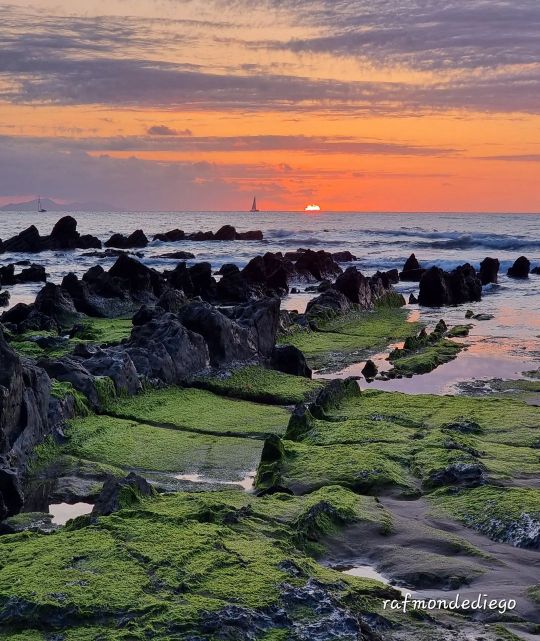
Sunset in Barrika (Bizkaia) [x]
#euskal herria#basque country#pays basque#pais vasco#euskadi#barrika#photography#bizkaia#beach#sea#coast#nature#seascape#travel#places
28 notes
·
View notes
Text
"Widely view as the political heir of the defunct armed group ETA".

The leftwing separatist coalition EH Bildu, widely viewed as the political heir of the defunct armed group ETA, made a major breakthrough in Sunday's Basque regional elections although falling short of the win predicted by pollsters.
With 99 percent of the vote counted, Bildu increased its representation from 21 to 27 mandates in the 75-seat Basque parliament, giving it the same result as the centrist Basque Nationalist Party (PNV), which has ruled the region for decades.
Polls had predicted a tight race, seeing a narrow victory for Bildu -- a coalition which has worked to disassociate itself from ETA, whose bloody struggle for an independent Basque homeland claimed 850 lives before it rejected violence in 2011.
And six years after ETA's dissolution, EH Bildu has pursued a winning strategy, putting its pro-independence demands on the back burner and focusing strongly on social issues, securing a solid following among young people under 40.
continue reading
#euskadi#euskal herria#basque country#pais vasco#pays basque#omfg#politics#the fascist propaganda reaches international press#basque elections#sigh
21 notes
·
View notes
Text
If the Perro quits we're very much fucked.
16 notes
·
View notes
Text
How the votes for Basque presidency have changed in Euskadi. [x]
#euskal herria#basque country#pays basque#pais vasco#euskadi#culture#politics#video#maps#elections#interesting
15 notes
·
View notes
Note
Hi!
Do you know if there's any Jewish history in EH? There are a lot of old (pre-Inquisition) Jewish buildings/art in Spain, Catalonia, and Portugal, but I'm not sure if there are EH. I'm just curious, since I've learned a lot about Jewish life in Spain before the Inquisition, but never about Jewish life in EH, if there even was any.
Thank you!
Kaixo and thanks for your message!
Of course there's Jewish history in EH! In Gipuzkoa there never was a big community, as well as in Araba, with the exception of Guardia. In Bizkaia, Balmaseda was the biggest center for Jews, but sadly they were forcibly expelled around 40 years prior to the expulsion from Castile. Jewish people flourished mainly in the southern side of Nafarroa in Muslim times: there were thriving Jewish communities in Lizarra, Tutera, Tafalla, even Iruña.
Luckily this didn't change after the Reconquista! Jewish people were mainly merchants and moneylenders - profession banned for Christians - and they would work with peasants and nobility alike. They were also wine makers, and this wine was very much appreciated not only in the kingdom of Navarre, but also in Aragón and Castile. Navarrese kings supported Jewish communities and welcomed any Jew from other region.
There's a tragic but moving story about this time. The Jewish community of Gasteiz was forced to leave, but they agreed to hand over their cemetery to the city on the condition of respect the ground and don't build on it. The promise was respected for 460 years until 1952, when Jewish representatives agreed with the town hall that the ground was available for any use. Nowadays, it's a park with this monument to Jewish people. The neighborhood is called Judimendi, "the mountain of Jewish people".
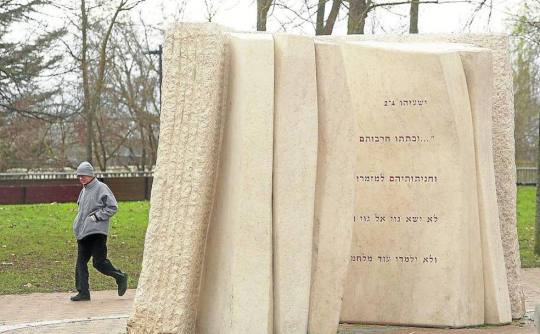
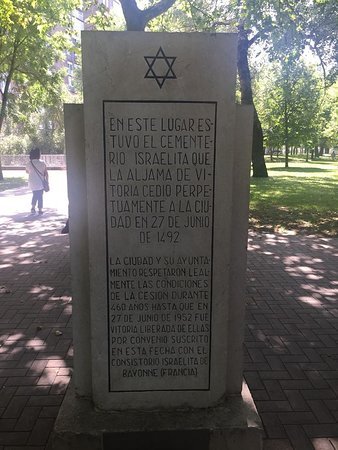
In fact, when the kingdom of Castile ordered the expulsion of Jews from Castile, most of them moved to the kingdom of Navarre. But after the conquest by Castile in 1512, Jews and Muslims were effectively expelled from their home. Most of them didn't go too far, just across the border, to Baiona.
Baiona welcomed Basque, Spanish and Portuguese Jews, gathering a very important community that led to call the town the little Jerusalem at one time. There's a much modern legacy there than south the border, for example, there's still a functioning synagogue.


After the French revolution, Jews were reocgnised the same rights and duties than any other French, so they kept their businesses and in Baiona, many of them devoted themselves to chocolate - still one of the best in Europe, I must add.
But during WW2 and nazi occupation, maaaany of these Jewish people were captured and led to extermination camps. The community didn't die, though, and they welcomed a new wave of Jewish refugees in the 60s due to the French-Algerian war.
René Cassin, one of the fathers of the Declaration of Human Rights, was a Jew from Baiona, btw.
Nowadays in Euskadi there are just around 300 Jews, while in Iparralde this figure is bigger but not super high (just around ~3,000 in the whole Aquitaine).
44 notes
·
View notes
Text
This video is clearly not meant for Basque people, but for Spaniardas that don't know Euskara. It's just an example of how Spanish fascists spread Basquephobia.
The members of Bildu celebrated their elections results with the expression "Jo ta ke". But do you know what it really means? Jotakes are grenades designed and developed by terrorist band ETA in the years 1987-88. They were used in attacks like the one against the headquarter houses of Zarautz on Aug 7th 1987. They were also used in the attack against the headquarter houses of Mungia on March 23rd 1991. In fact, ETA former leader Txapote used this same expression during a trial at the National Audience. This expression was popularized by ETA-supporting band Su Ta Gar and that's why now it's used in different contexts meaning "hit it hard until victory". What do you think about Bildu now using this saying?
[x]
Jo ta ke means, literally, hit and smoke. It's believed it comes from what was said at the iron factories: hit (the iron) and then burn, hit (the iron) and the burn, all the time until the work was done. With time, it became a synonym of tirelessly. So the super usual saying in political or sport contexts Jo ta ke irabazi arte! just means Tirelessly or non-stop until victory.
It existed long before Su Ta Gar's song ffs.
The grenades were called jotakes because of this same meaning: we keep going towards victory non-stop, as the weapons were means for ETA to achieve their goals.
Jo ta ke - and Basque language in general - isn't something that was born for ETA or ETA-supporting environments as these fascists like to make people believe, once and again. They're indeed jo ta ke until more and more people hate Basques. Luckily, many know better but still this is plain misinformation and blatant Basquephobia.
They're just bitter EH Bildu had an incredible result at the Basque elections and because ~70% of Basque votes were for Basque nationalist parties.
#euskal herria#basque country#pays basque#pais vasco#euskadi#spain#fatxis gonna fatxing#politics#video#euskera#euskara#basque#languages#spanish#basquephobia
56 notes
·
View notes